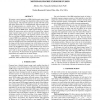Free Online Productivity Tools
i2Speak
i2Symbol
i2OCR
iTex2Img
iWeb2Print
iWeb2Shot
i2Type
iPdf2Split
iPdf2Merge
i2Bopomofo
i2Arabic
i2Style
i2Image
i2PDF
iLatex2Rtf
Sci2ools
ICIP
2010
IEEE
2010
IEEE
Motion-blur-free exposure fusion
We present a novel approach to HDR (high-dynamic-range) image fusion that copes with image blur degradation often present in longexposed images. The proposed approach can deal with both camera and object motion blur in a computationally efficient manner suitable for implementation on a mobile device. The main idea is to exploit the differences between the image degradations that affect images captured for HDR fusion. Short-exposed images are mainly affected by sensor noise and less affected by motion blur, whereas longer exposed images are less noisy but potentially blurry due to motion during their exposure. Our approach consists of two steps. First we calculate an HDR representation of the scene by applying a typical HDR fusion approach. This representation could be blurry if some of the input images with long exposure time are blurry. We then fuse the HDR result with a photometrically modified version of the image with the shortest exposure time, which allows us to retain the sharp...
Related Content
| Added | 12 Feb 2011 |
| Updated | 12 Feb 2011 |
| Type | Journal |
| Year | 2010 |
| Where | ICIP |
| Authors | Marius Tico, Natasha Gelfand, Kari Pulli |
Comments (0)

